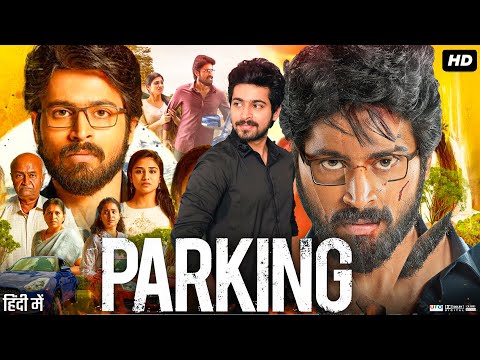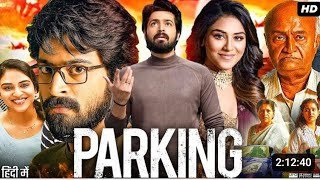Parking is a tightly wound Tamil-language drama thriller (127 min) by debut director Ramkumar Balakrishnan. On paper, it’s a simple dispute over a parking spot in a shared duplex. In reality, it’s a searing exploration of ego, primal instincts, generation clash, and how small standoffs can spiral into moral freefall.
1. Plot & Escalation
- Eshwar (Harish Kalyan), a techie, and pregnant wife Aathika move in upstairs under Ilamparuthi (M.S. Bhaskar), a stingy elder with a decade of tenant seniority.
- Initially amicable until Eshwar buys a car and uses the shared parking. Ilamparuthi retaliates by scrubbing away his space—eventually buying a car himself.
- What starts as minor annoyance escalates through public insults, slaps, false police complaints, property sabotage, near-fatal tampering, and even gas leaks.
- The climax forces both to confront the depths they’ve sunk to, amid Aathika’s labor and moments of humanity, ending with mutual apology and the decision to move out.
2. Characters: Mirrors of Ego
- Ilamparuthi: A classic baby‑boomer who saves every penny, fixes rather than replaces, and prides himself on thrift. When threatened, he spirals from quiet dignity to calculated vengeance.
- Eshwar: Represents younger India—aspiring, protective, impulsive. He means well, but ego blinds him, turning him reactive and sometimes reckless.
- Aathika, Selvi & Aparna: The wives and daughter become the emotional fulcrum. Their pain and occasional rebellion puncture the male duel, reminding us of the collateral damage.
The director wisely avoids caricature: neither man is wholly villain or victim. The tension lies in how both mirror each other’s worst instincts.
3. Themes & Psychological Insights
- Ego vs. Humanity: A banal conflict becomes a battleground for identity. Who has the right? Who wins? The film asks: is morality negotiable when your pride is hit?
- Freudian Id Unleashed: Furies rise when civility cracks. Both men revert to primal impulses—violence, deceit, manipulation—raising the question: is civility superficial?
- Ripple Effects: Financial, relational, legal, emotional—their war disrupts not just each other, but their families and community.
- Moral Balance: In a key moment, Eshwar realizes Ilamparuthi saved Aathika during labor. That act doesn’t erase their feud, but it pivots the narrative toward redemption.
4. Direction, Pacing & Technical Craft
- Screenplay: Tight, purposeful escalation keeps viewers on edge. Events unfold naturally—but their cumulative impact is devastating.
- Editing & Music: Sharp cuts and a suspenseful score make each scene feel intensively charged—as though every secondary detail (a glare, a door slam) could ignite conflict.
- Visual Tone: Everyday domestic spaces—a duplex home, parking spot—become pressure cookers. The geography feels intimate, trapped, claustrophobic.
5. Emotional & Moral Journey
- The film starts as relatable—domestic, prosaic. Then unease creeps in. Soon, you’re anxious, uncomfortable, fearing the next escalation.
- You’re forced to empathize with both men—while fearing where they’ll go next.
- Finally, the resolution comes not with celebration, but with quiet regret and mutual acknowledgment of “we went too far.”
6. Why It Resonates
- Critics describe it as a “dark journey to the center of the human ego”.
- Audiences noted its tension-filled atmosphere:
“Parking must be the most stressful movie I’ve watched since Uncut Gems … had to pause so many times” (reddit.com).
- Reddit comparison: likened to Beef—two average people locked in slow-motion mutual destruction over something trivial(reddit.com).
7. Final Take
Parking is not about a car or a space. It’s a psychological duel—a vivid parable of clashing wills, fragile civility, and how easily we cross lines. Both men represent deep truths about ambition, wounded pride, generational divides—and ultimately, what it costs to escalate petty conflicts.
✅ In Conclusion
Parking is a quiet domestic thriller in which a simple parking dispute becomes an intense study of rage, rivalry, and remorse. It leaves you pondering:
- How quickly anger eclipses reason
- How pride justifies cruelty
- And how a single act of compassion can disrupt that spiral

